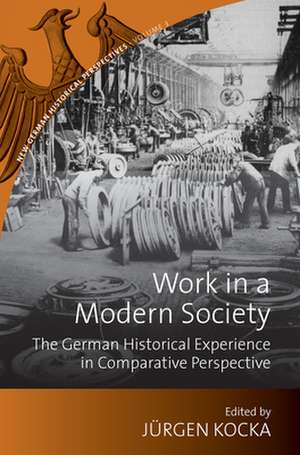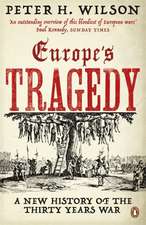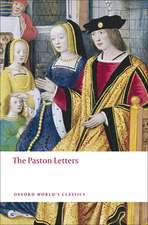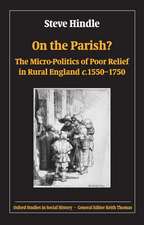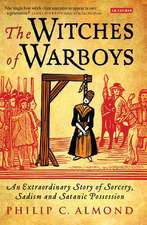Work in a Modern Society: New German Historical Perspectives, cartea 3
Editat de Jurgen Kockaen Limba Engleză Paperback – 31 mar 2013
Jürgen Kocka taught Social History at the University of Bielefeld for many years, after which he was appointed Professor of History of the Industrial World at the Free University of Berlin and Research Professor at Berlin Social Science Research Centre (WZB). He has published widely in the field of Modern History, particularly Social and Economic History of Europe, 18th-20th centuries. His publications in the English language include Facing Total War. German Society 1914-1918 (Berg, 1984), Industrial Culture and Bourgeois Society. Business, Labor, and Bureaucracy in Modern Germany (Berghahn, 1999), Civil Society and Dictatorship in Modern German History (University Press of New England, 2010) and Comparative and Transnational History. Central European Approaches and New Perspectives (Berghahn 2009, edited together with Heinz-Gerhard Haupt).
Preț: 258.28 lei
Nou
Puncte Express: 387
Preț estimativ în valută:
49.44€ • 53.72$ • 41.55£
49.44€ • 53.72$ • 41.55£
Carte tipărită la comandă
Livrare economică 21 aprilie-05 mai
Preluare comenzi: 021 569.72.76
Specificații
ISBN-13: 9781782381112
ISBN-10: 1782381112
Pagini: 230
Dimensiuni: 152 x 229 x 12 mm
Greutate: 0.31 kg
Editura: BERGHAHN BOOKS INC
Seria New German Historical Perspectives
ISBN-10: 1782381112
Pagini: 230
Dimensiuni: 152 x 229 x 12 mm
Greutate: 0.31 kg
Editura: BERGHAHN BOOKS INC
Seria New German Historical Perspectives
Notă biografică
Jurgen Kocka taught Social History at the University of Bielefeld for many years, after which he was appointed Professor of History of the Industrial World at the Free University of Berlin and Research Professor at Berlin Social Science Research Centre (WZB). He has published widely in the field of Modern History, particularly Social and Economic History of Europe, 18th-20th centuries. His publications in the English language include Facing Total War. German Society 1914-1918 (Berg, 1984) and Industrial Culture and Bourgeois Society. Business, Labor, and Bureaucracy in Modern Germany (Berghahn, 1999).
Cuprins
Chapter 1. Work as a Problem in European History Jurgen Kocka Chapter 2. Discourses on Work and Labour in Fifteenth- and Sixteenth-century Germany Josef Ehmer Chapter 3. Beginnings of the Anthropology of Work: Nineteenth-century Social Scientists and Their Influence on Ethnography Gerd Spittler Chapter 4. The Vision(s) of Work in the Nineteenth-century German Labour Movement Thomas Welskopp Chapter 5. Work in Gender, Gender in Work: the German Case in a Comparative Perspective Karin Hausen Chapter 6. Trust as Work Ute Frevert Chapter 7. Soldiering and Working: Almost the Same? Reviewing People's Practices in Industry and Military in Twentieth-century Contexts Alf Ludtke Chapter 8. Forced Labour in the Second World War: the German Case and Responsibility Klaus Tenfelde Chapter 9. Work, Max Weber, Confucianism: the Confucian Ethic and the Spirit of Japanese Capitalism Sebastian Conrad Chapter 10. What is Global Labour History Good For? Andreas Eckert Notes on Contributors Bibliography Index
Recenzii
"This insightful book should reach an interdisciplinary audience of scholars, students, and laypersons. Its theses compellingly argue against theoretical demarcations and for more boundary crossings among disciplines and definitions." * German Quarterly " - an interesting and informative collection that brings together original contributions from some leading European scholars whose work may not be familiar to a British and American audience. As such it is a valuable addition to the literature in English on labour history and likely to provide a jumping off point for those seeking to expand their knowledge of this area." * European Review of History - Revue europeenne d'histoire "Kocka, arguably the doyen of social history in Germany, introduces this volume with a succinct overview of the changing meanings of work from European antiquity to the present - For some decades labour studies were dominated by social histories that replaced the earlier histories of workers' parties and unions. In Germany, Kocka was one of the key figures who tried to make actual working lives visible behind labour leaders' speeches, rivalries, and organizational structures" * Labour/Le Travail
